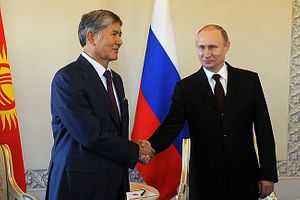On May 21, with a signature, Kyrgyz President Almazbek Atambayev committed his country at last to the Russian-led Eurasian Economic Union. The EEU’s leaders had agreed to admit Kyrgyzstan earlier this month when they gathered in Moscow for the Russia’s Victory Day celebrations. All that remains now for Kyrgyzstan’s complete accession to the EEU is ratification of the treaty by the parliaments of the other members–Russia, Kazakhstan, Belarus and Armenia. At this point, it’s all just formalities.
Although Kyrgyzstan expressed interest in being a founding member in the EEU, the functional details could not be worked out in time for the January 1, 2015 launch of the union. Another deadline–May 1–was also missed as the last few agreements between Kyrgyzstan and the EEU caught snags. With each passing deadline concern rose in the country over the wisdom, benefits, and risks of accession.
At the signing ceremony, Atambayev said joining, “one of the world’s largest economic unions fully corresponds to Kyrgyzstan’s national interests.”
Not all in Kyrgyzstan have held this view. In late April, as it became apparent the May 1 deadline would be missed, 24.kg carried a story noting that officials were becoming decidedly less optimistic as time went on:
Kyrgyzstan is at the finish line. All of the most important documents have been adopted. But the closer the final story of the Eurasian vector of the Kyrgyz Republic, the less optimistic is the statements of officials. More often one can hear the statement that there won’t be “a land of milk and honey.”
“For Kyrgyzstan joining the Eurasian Economic Union – an opportunity to reach a wider market. Eurasian Economic Union policy aims to support domestic producers. We have never said that everything will be fine after joining the union. Of course, there will be difficulties,” Temir Sariev confessed during a round table in 24.kg news agency.
But, as Kyrgyzstan’s former Prime Minister Djoomart Otorbaev told Eurasianet last year, Kyrgyzstan didn’t really have much of a choice in the matter of accession, “there is no alternative.”
Economic troubles emanating from Russia, exacerbated by Western sanctions and last year’s drop in oil prices, have caused trade turbulence during the EEU’s first few months. Kazakhstan and Russia may be engaging in a trade war, which doesn’t bode well for the union’s desired common market.
Still, Kyrgyzstan hopes the benefits outweigh the risks. RFE/RL reports that Atambayev said membership would bring in money–in the form of a Kyrgyz-Russian Development Fund worth $1 billion–and ease the life of the thousands of Kyrgyz migrant workers in Kazakhstan and Russia. Russia has gradually made life more difficult for migrant workers, especially for those from states outside the EEU. Tajikistan and Kyrgyzstan both rely on migrant workers’ remittances for a significant portion of their respective GDPs. To date, Tajikistan hasn’t done much more than express vague interest in the EEU.
































